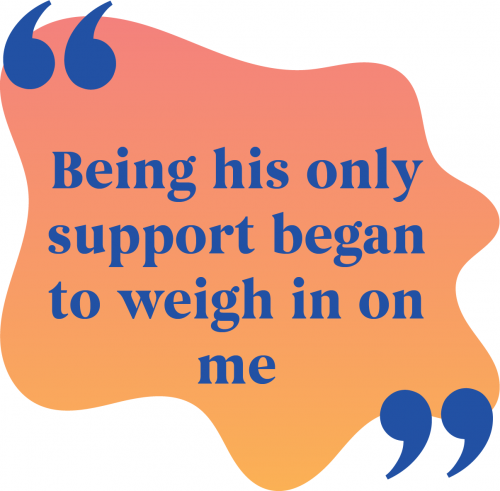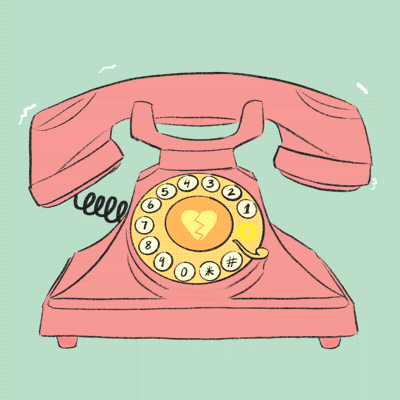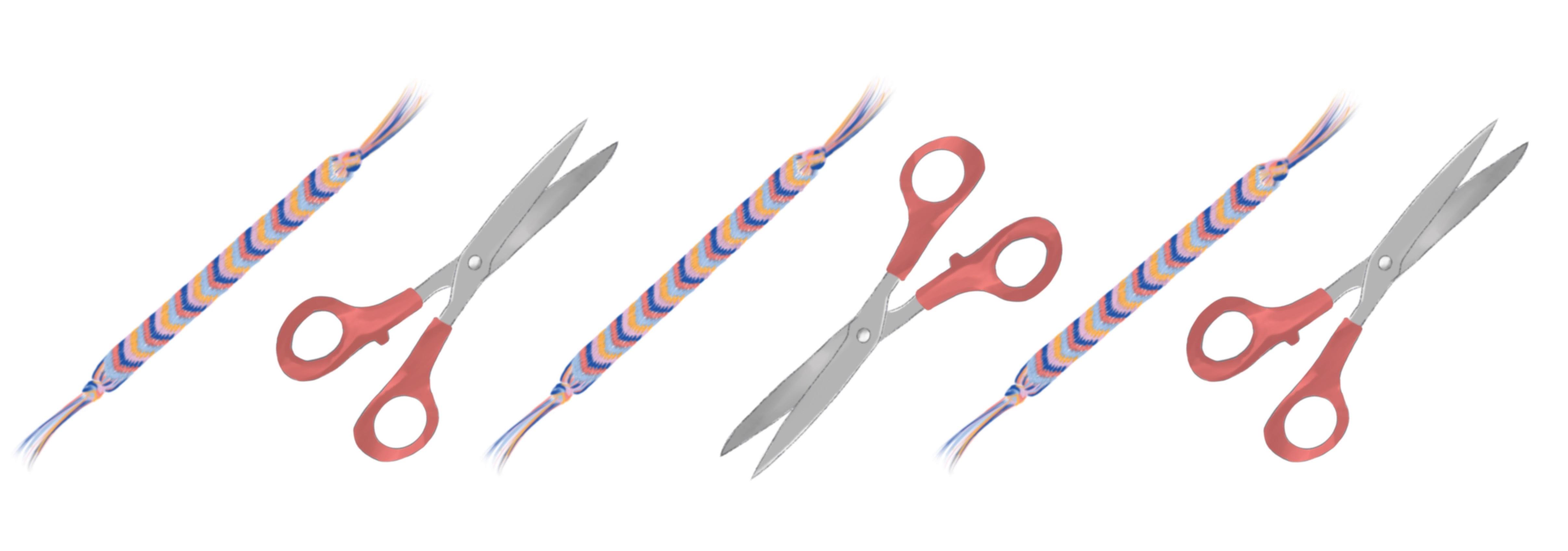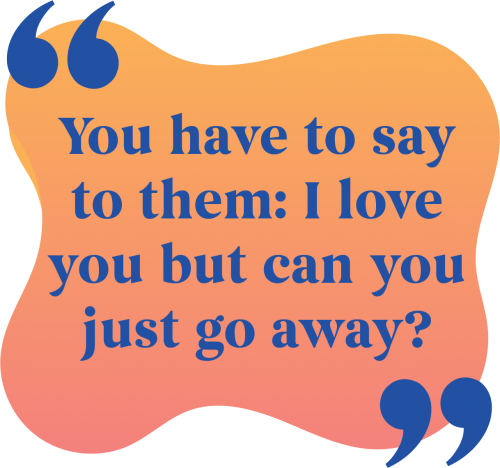When you’re at capacity and not in the right headspace right now
Words by Sofia Vavaroutsos
Illustrations by Laila Amer
CONTENT WARNING: This article discusses mental health crises, self-harm and self-destructive behaviour.
IN GRADE 11 I hardly slept. I hardly ate. I went through the school year in a daze. It all started when one of my best friends at the time, Adrian*, started opening up to me about his struggles with mental health and self-destructive behaviours, which arose from his experiences with depressive symptoms.
At first, I was glad he reached out to someone, and especially glad that he felt secure enough in our friendship to share such sensitive experiences with me. Over time, though, being his only support began to weigh in on me. When you know that anything you do or say could change the way events play out—whether someone chooses to engage in self-harm that night or not—it makes you think twice about your words and actions. As someone who had never shared or experienced the same problems, I didn’t always know the right things to say to him. Seeing what happened when I said the wrong thing made me feel worse.

After almost a year, his problems worsened, and he started engaging in behaviour that could hurt not only himself but others as well. I knew I couldn’t handle it anymore. He would unscrew the railings at school in an attempt to have people fall when they tried to grab it. One day, I saw a student with a disability fall down several steps because of Adrian’s behaviour. That day I made one of the most difficult decisions of my life: getting outside help.
I shared what was going on with the school principal and guidance counsellors and they told me that in order to proceed, they would need to tell Adrian how they knew.
I told them to go for it. Adrian was furious, even going as far as to send me threats—after all, I’d promised I would never tell anyone. We have not spoken since that day.
The whole experience changed the way I look at friendships. I never want to place the type of burden on someone that Adrian put on me by making their behaviour my responsibility. Even now, years after this all happened, I still remember how burnt out I was that year and how hard the decision to stop being a support system was.
In a 2017 article posted by Psychology Today, Emma Seppälä details how burnout is common among those who find themselves supporting others. She notes that even people whose careers revolve around providing support, like psychologists and social workers, are finding it draining to do that work.
Seppälä’s article states that despite the fact that supporting others is a source of happiness for most people, when you don’t go about it correctly, you too can feel exhausted to continue that support. Seppälä adds that in these situations not only are you missing that key source of happiness, but you’re also dealing with burnout and potentially guilty feelings surrounding not being able to provide that support.

OR JESSICA MAZZE*, a first-year journalism student, what started as helping a friend navigate feelings of self-loathing and a disruptive home life in Grade 9 ended up taking most of her mental energy and time during her day-to-day life. This left Mazze feeling exhausted by the time she got to the end of Grade 12.
“It took a toll on me and my friendships. By that point in Grade 12, I just wanted to focus on getting into university and surviving the last year while keeping some semblance of myself, ” she said.
In her second semester of Grade 12, Mazze was so consumed by the issues her friend was facing that she wasn’t able to stop thinking about it long enough to even eat dinner with her family. Mazze would sit at the table, thinking about whether her friend was engaging in destructive behaviour in the half-hour since they last spoke. At school, she’d sit in class, unable to focus on the material being taught, not even feeling up to talking to her friends at lunchtime. “I would just sit there and listen to the conversations, and still be nice. But, I would just tune it all out. It was a way to survive.”
Jiaqing Wilson-Yang, acting manager at Ryerson’s Consent Comes First office, noted that similar feelings of burnout among supporters can be common.

“Burnout can affect people in lots of ways; feeling really tired all the time, feeling distracted. There’s also compassion fatigue that some people experience where normally they would be really empathetic or care about what’s happening, but they just don’t have the capacity,” she said.
Mazze decided that the best decision was to end the friendship after high school graduation. “I just said to myself, ‘You can’t keep being the support for someone who’s constantly tapping into your energy.’”
Wilson-Yang explained this kind of damage to a friendship is not unheard of. However, it is much more likely to be able to avoid that when clear boundaries are set.
“When you have those boundaries in place, you’re not breaking an agreement that you had with someone, you’re not breaking a promise or a commitment.”
Establishing boundaries isn’t always a straightforward process. In November 2019, Melissa Fabello, a feminist wellness educator, started a debate on Twitter after she tweeted a template which she provided to someone who asked her for a response to give when they can’t support someone. Fabello’s response reads:
“Hey! I’m so glad you reached out. I’m actually at capacity/helping someone else who’s in crisis/dealing with some personal stuff right now, and I don’t think I can hold appropriate space for you. Could we connect [later date or time] instead/ Do you have someone else you could reach out to?”
While many on Twitter criticized the tweet for being too harsh, Wilson-Yang said that, depending on the context or situation, a message like that could be a good way to set a boundary. She notes, however, that it’s important to emphasize how much it means to you that the person reaching out chose to do so.
Wilson-Yang added that if you still want to offer some support you can also give the person alternatives.
She said that rather than agreeing to be their primary support system all the time, suggest a “low-key hangout” at a time when you’re available—if it will help take their mind off of what’s going on. She suggested a quiet movie night or even going for a walk with the person. These are activities that can be a low commitment for you, but still be relaxing for both you and the person who needs support.

OR JOHN JOSEPH, a fourth-year business management student, the stress of being in his graduating year makes it difficult to have time to support his friends. “You have to say to them in the nicest way possible, ‘I love you but can you just go away? I am not the person for this right now,’” Joseph explained.
“After a long day, you don’t really want to talk to anybody, you just want to sink in your bed. But then, there [are] all these people [saying] they absolutely need you.”
Joseph said that setting boundaries has been a major way that he is able to care for himself while being a good friend. He said he has mutual agreements with certain friends so they can continue to support one another. But, for people outside of that group, he finds a nice way to say that he can’t.
Joseph recalled a time when he helped a friend resolve issues with her then-boyfriend. While Joseph was the main support for her at the time, he wasn’t in the right headspace to support her. He did his best to help her, even if it meant sacrificing time for schoolwork, but admits to ignoring many of her calls and texts because he needed a mental break. They are still friends today, and Joseph knows that she would step in and support him if he needed it.
In Joseph’s case, the burnout itself was not the worst part. Rather, he said that the guilt which came along with not being able to support his friend was what made his situation much worse.

In scenarios like this, Wilson-Yang recommends that students build their own network of support outside of the situation. “I would suggest that you have someone that you can talk to, whether it’s a therapist or someone else that you can share how it’s impacting you,” she said.
Additionally, she suggested practicing self-care, whatever that means for the individual. For some, it could be meditation, painting or reading. For others, self-care could be doing a workout or playing a sport. Wilson-Yang made it clear that self-care is whatever makes the person feel like themselves, and whatever makes them happiest—it doesn’t have to look calming or meditative, as it’s often portrayed.
In both Joseph and Mazze’s cases, it has changed how they view friendships.
Mazze said that she is more careful about getting close to people because she doesn’t want to become someone’s only support system again. For Joseph, it has made him more careful about how many people he has the ability to include and support in his friend group.
Wilson-Yang noted though there can be pressure to be the best friend one can be, and it’s important to keep in mind one’s individual capacity.
“There doesn’t need to be a singular model of what being a friend or providing support is,” she said. “I think there needs to be that clear communication about what you’re going to do and what you’re able to do.”
*Jessica Mazze is a regular contributor to The Eyeopener











Leave a Reply